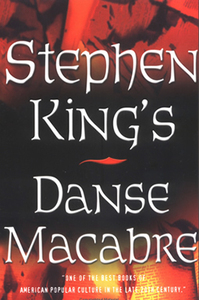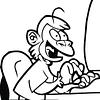Take a photo of a barcode or cover
Danse Macabre is Stephen King covering the horror genre, in TV, film, radio, and text, from roughly 1950-1980. I'd been meaning to read this for a long time. The Kindle price was the clincher.
I don't really know what to say about this one. It was pretty middle of the road. Stephen King writes about three decades of the horror genre in various media. I thought some of the subjects were interesting, namely the movies and the books, many of which I'll have my eye out for. His insights on the nature of horror and why we like it so much were thought-provoking. However...
Okay, I'm a big Stephen King fan and think he's a great writer, even though he cranks out a best-seller as often as I pay my car insurance. He can be a bit wordy at times. With his prose, I don't notice it so much. With non-fiction, holy hell did I notice!
[b:The Shrinking Man|33549|The Shrinking Man|Richard Matheson|https://images.gr-assets.com/books/1327914031s/33549.jpg|936694] and [b:The Haunting of Hill House|89717|The Haunting of Hill House|Shirley Jackson|https://images.gr-assets.com/books/1327871336s/89717.jpg|3627] were both barely longer than novellas but King drones on about them for twenty pages apiece! The autobiographical bits were way more interesting to me than some of the movies and books he wrote about. I have trouble giving a shit what Stephen King thinks about obscure B-movies made a couple decades before I was born that would seem hokey by today's standards.
Longwindedness aside, I did find the book informative and it added things to my watch list. Also, King shat on John Saul a few times. Was Saul the James Patterson of Horror in his day? Will my life have an unfillable void in it if I never read John Saul (or James Patterson)? Things to ponder.
You know what's not as fun as reading horror fiction or watching horror movies? Reading about what someone else thinks about them for one hundred pages too many! Three out of five stars.
I don't really know what to say about this one. It was pretty middle of the road. Stephen King writes about three decades of the horror genre in various media. I thought some of the subjects were interesting, namely the movies and the books, many of which I'll have my eye out for. His insights on the nature of horror and why we like it so much were thought-provoking. However...
Okay, I'm a big Stephen King fan and think he's a great writer, even though he cranks out a best-seller as often as I pay my car insurance. He can be a bit wordy at times. With his prose, I don't notice it so much. With non-fiction, holy hell did I notice!
[b:The Shrinking Man|33549|The Shrinking Man|Richard Matheson|https://images.gr-assets.com/books/1327914031s/33549.jpg|936694] and [b:The Haunting of Hill House|89717|The Haunting of Hill House|Shirley Jackson|https://images.gr-assets.com/books/1327871336s/89717.jpg|3627] were both barely longer than novellas but King drones on about them for twenty pages apiece! The autobiographical bits were way more interesting to me than some of the movies and books he wrote about. I have trouble giving a shit what Stephen King thinks about obscure B-movies made a couple decades before I was born that would seem hokey by today's standards.
Longwindedness aside, I did find the book informative and it added things to my watch list. Also, King shat on John Saul a few times. Was Saul the James Patterson of Horror in his day? Will my life have an unfillable void in it if I never read John Saul (or James Patterson)? Things to ponder.
You know what's not as fun as reading horror fiction or watching horror movies? Reading about what someone else thinks about them for one hundred pages too many! Three out of five stars.
funny
informative
lighthearted
reflective
slow-paced
The biggest knock against this book is that it's almost forty years old. Sections of it are dated, and they can wear on if you're a fan of the genre and you've already understood its evolution. I felt this a bit more in movies than in fiction, for the latter has a strange timelessness to it.
Probably best read in companion to On Writing, which delves much less into the horror aspects of his career.
There are some truly wonderful sections though. The last chapter might be as an effective of a summation of King's horror career (pre-It, basically) as we'll ever get.
I can say thankya for that.
Probably best read in companion to On Writing, which delves much less into the horror aspects of his career.
There are some truly wonderful sections though. The last chapter might be as an effective of a summation of King's horror career (pre-It, basically) as we'll ever get.
I can say thankya for that.
After reading and loving On Writing, I was hoping for a similar level of insight and inflection in this book. Instead, it's more of a tour through the history of the genre, and read more like a lengthy academic paper. That's not entirely a bad thing; I learned a lot, especially about the works that have influenced King over the years, but I was hoping for a little less "here's a book/movie/show/etc. that influenced me" and a little more "here's how I look at the genre I excel at." It's worth a read for history buffs who are interested in how the horror genre has evolved over the years, but if you're looking for the kind of writing insights that King offered with On Writing, it'll be a bit of a disappointment.
King rambles on wryly and unpretentiously like an old friend about horror fiction, and like an Old friend, is apt to go on wild and interesting tangents. He has a disdain for hauty over-analysis, understandable considering the eternal question of why he would write horror of all things, but a true love for scary fantasy that makes reading this sometimes rant of a book enjoyable. Also has a big list of King's favourite films and books to delve into in the back , heh-heh.
A fun little non-fiction book by King written fairly early in his career. There's a certain novelty to hear young Stephen's thoughts about horror, written as he was still working on [b:Pet Sematary|33124137|Pet Sematary|Stephen King|https://images.gr-assets.com/books/1480069533s/33124137.jpg|150017], and well before his best string of books (such as [b:It|830502|It|Stephen King|https://images.gr-assets.com/books/1334416842s/830502.jpg|150259], [b:Misery|10614|Misery|Stephen King|https://images.gr-assets.com/books/1270545451s/10614.jpg|3230869], and so forth). The section on horror movies is almost quaint, since it focuses on horror movies of the 50s, 60s and 70s. One wishes for a sequel where we hear his thoughts on the 80s golden age of horror shlock cinema (largely thanks to the popularity of his own work!). It's weird to think this was written before even the first Nightmare on Elm Street was released.
The re-release contains a new introduction by King where he talks about more recent movies (mostly lavishing praise on The Blair Witch Project), which brings it more up to date, although even that section is already dated.
This is a good read if you're a King completest, or fan of the genre, but it's not what I would call essential reading. His insights are good, but they're more geared for fellow fans than anything else.
The re-release contains a new introduction by King where he talks about more recent movies (mostly lavishing praise on The Blair Witch Project), which brings it more up to date, although even that section is already dated.
This is a good read if you're a King completest, or fan of the genre, but it's not what I would call essential reading. His insights are good, but they're more geared for fellow fans than anything else.
While this is as enjoyable as any other Stephen King book in terms of his voice and his ideas, it's a bit dated now so I couldn't finish it.
Like all of King's books, this could have been at least 100 pages shorter without losing a thing. That said, it was a reasonably interesting and insightful survey of horror as a genre. This book was at its best when it was peeling back the curtain on just what parts of the human condition make scary things scary.
I would recommend it to aspiring horror writers or any students of the genre if you don't mind a little...erm...outdated language. Definitely a product of its time in terms of some of King's underlying viewpoints. But a decent analysis if you are willing to look past that.
I would recommend it to aspiring horror writers or any students of the genre if you don't mind a little...erm...outdated language. Definitely a product of its time in terms of some of King's underlying viewpoints. But a decent analysis if you are willing to look past that.
Quick, easy read. Very America-centric, and King tended to belabour his points a bit, but the book did leave me wanting to read/watch the stories he talked about. I've mostly bounced off those of King's books that I've tried reading before, but I might have another go at them.
If you're looking to jump into Stephen King's non-fiction, start with On Writing instead. This book is just kind of... well, I guess unnecessary. I was hoping to find a lot of stuff that I would really want to read, but it felt like King had no real structure for this book, which was published in 1981, the same year as Cujo.
Incidentally, King has admitted to being so drunk during the writing of Cujo that he has no memory of writing it, and it would not be hugely surprising if the same was true of Danse Macabre. It's just not very coherent, he has a habit of bad-mouthing critics and academics while simultaneously trying his hand at criticism and pretty tedious academic concepts.
His autobiographical chapter is interesting, and the bit at the end where he talks about the inspiration for the Stand is also pretty excellent, but his discussions of film, TV, and especially horror literature are pretty disappointing. There's just not much of substance in there, and in spite of mentioning Lovecraft dozens of times through the book, he never really touches on him.
Also, it's dated -- the TV and film sections are so out of date as to be almost entirely unnecessary, which is not King's fault, but which should give you a little more reason to pass on this book and to dive into some of his much, much better fictional work.
Incidentally, King has admitted to being so drunk during the writing of Cujo that he has no memory of writing it, and it would not be hugely surprising if the same was true of Danse Macabre. It's just not very coherent, he has a habit of bad-mouthing critics and academics while simultaneously trying his hand at criticism and pretty tedious academic concepts.
His autobiographical chapter is interesting, and the bit at the end where he talks about the inspiration for the Stand is also pretty excellent, but his discussions of film, TV, and especially horror literature are pretty disappointing. There's just not much of substance in there, and in spite of mentioning Lovecraft dozens of times through the book, he never really touches on him.
Also, it's dated -- the TV and film sections are so out of date as to be almost entirely unnecessary, which is not King's fault, but which should give you a little more reason to pass on this book and to dive into some of his much, much better fictional work.



